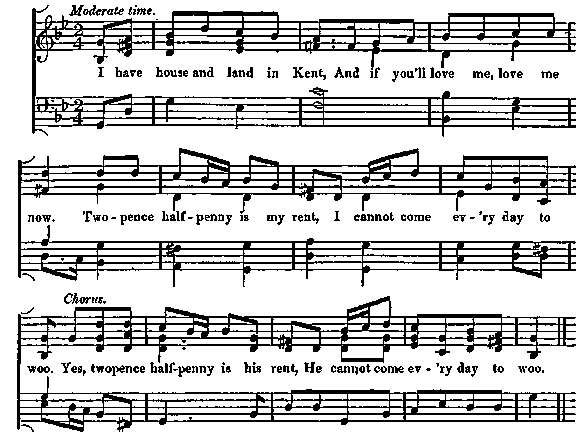Popular Music Of The Olden Time Vol 1
Ancient Songs, Ballads, & Dance Tunes, Sheet Music & Lyrics - online book
| Share page | Visit Us On FB |
|
|
|||||
|
W) |
ENGLISH SONG AND BALLAD MUSIC. |
||||
|
|
|||||
|
I HAVE HOUSE AND LAND IN KENT.
This song, which is one of the " Country Pastimes," in Melismata, 1611, is on the same subject as Quoth John to Joan, page 87. The tunc begins like The Three Havens, but is in quicker time. In Melismata it is called A Wooing Song of a Yeoman of Kent's son, and the words are given in the Kentish dialect. |
|||||
|
|
|||||
 |
|
||||
|
Ich am my vather's eldest zonne,
My mother eke doth love me well; For ich can bravely clout my shoone, And ich full well can ring a bell.a Chorus.—For he can bravely clout his shoone, And he full well can ring a bell.
My vather he gave me a hogge,
My mouther she gave me a zow ; I have a godvather djiglls there by, And he on me bestowed a plow. Chorus.—He has a godvather dwells there by, And he on him bestowed a plow.
One time I gave thee a paper of pins,
Anoder time a taudry lace; And if thou wilt not grant me love, In truth ich die bevore thy vace. Chorus.—And if thou wilt not grant his love, In truth he'll die bevore thy face.
■ Bell-ringing was formerly a great amusement of the English, and the allusions to it are of frequent occurrence. Numerous payments to bell-ringers are generally to be |
Ich have beene twise our Whitson lord,
Ich have had ladies many vare; And eke thou hast my heart in hold, And in my mind zeemes passing rare. Chorus.—And eke thou hast his heart in hold, And in his mind zeemes passing rare.
Ich will put on my best white slopp, •
And ich will wear my jellow hose, And on my head a good gray hat, And in't ich stick a lovely rose. Chorus.—And on his head a good gray hat, And i'nt he'll stick a lovely rose.
Wherefore cease off, make no delay,
And if you'll love me, love me now ; Or else ich zeek zome oder where, For I cannot come every day to woo. Chorus.—Or else he'll zeek zome oder where, For he cannot come every day to woo.
found in Churchwardens* accounts of the 16th and 17th centuries. |
||||
|
|
|||||